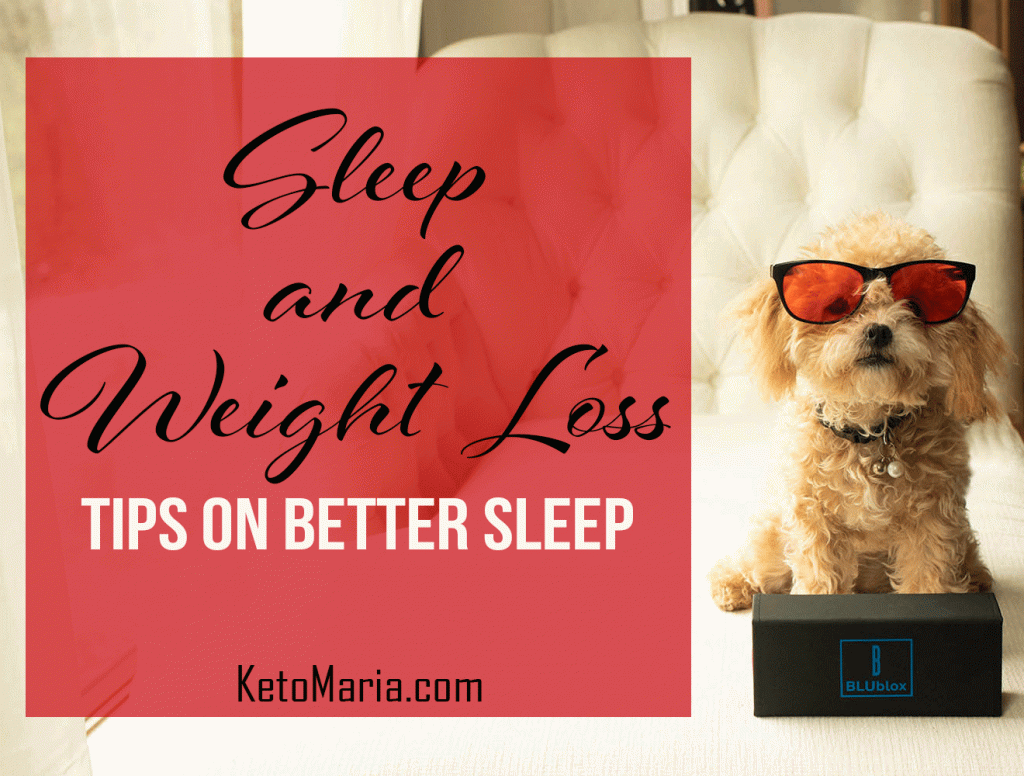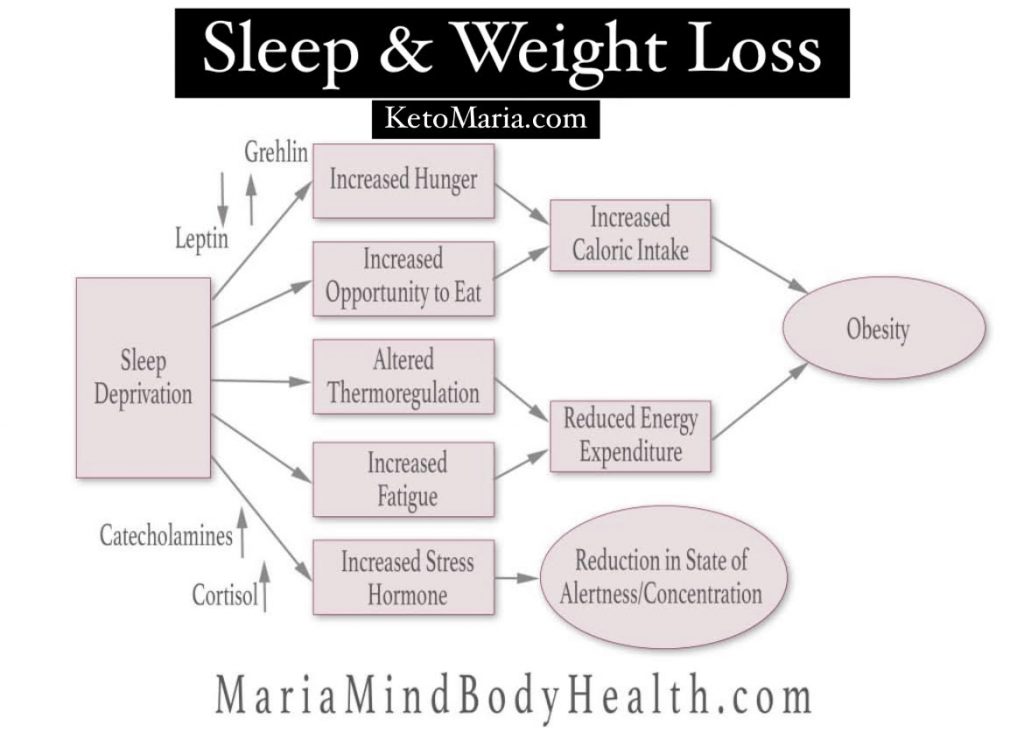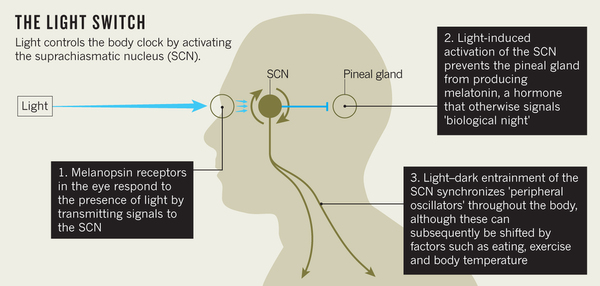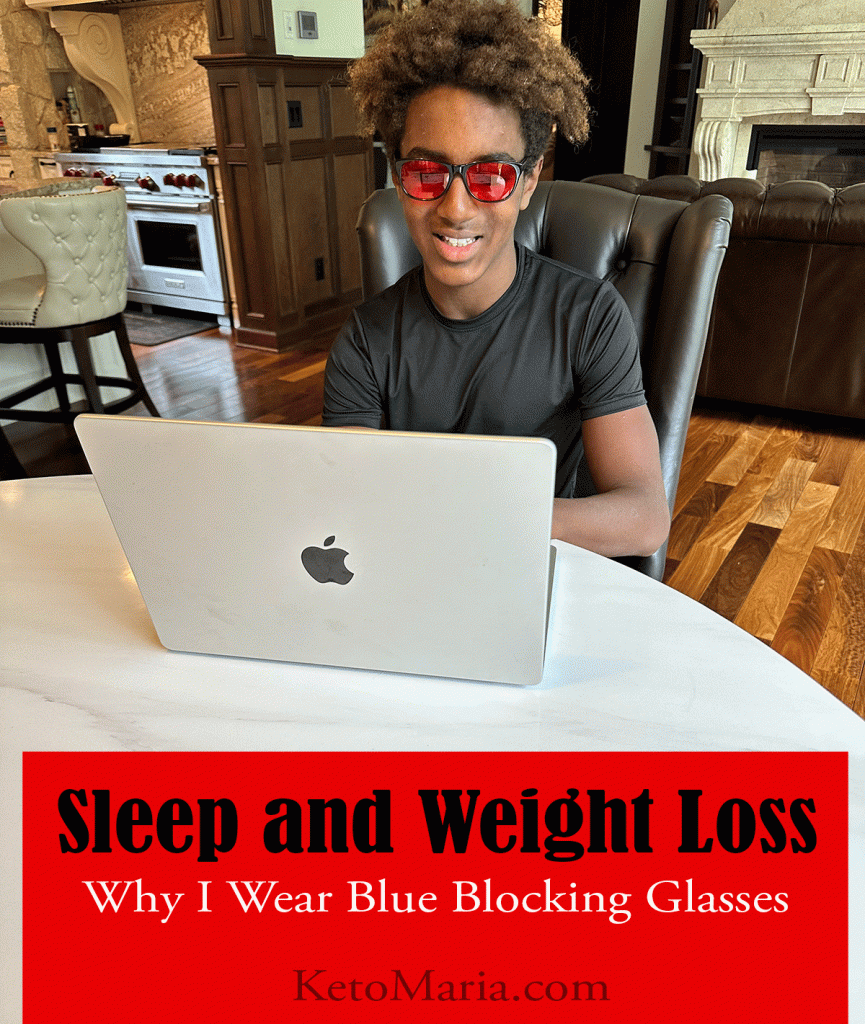
Have you ever noticed after a night of poor sleep, are you extra hungry? Do you often fall off your diet after a poor night of sleep?
After a poor night of sleep, your blood sugars are automatically higher causing you to become hungrier, you crave carbohydrates and you often gain weight over consecutive nights of poor sleep.

Many people gain weight in the summer and one main reason is that they skimp on sleep. It’s easy to get 8-10 hours of sleep when it gets dark out at 4:30pm in January, but who wants to go to bed when it’s still light out?
I worked with a lot of gastric bypass patients and in the past, we used to think that they had sleep apnea after they gained weight BUT we now know that the lack of sleep = leptin resistance = don’t feel the sense of feeling full = overeating = weight gain! bad bad bad.
Often times I talk with clients on the phone and they tell me they are eating from my meal plans but their blood sugars are still high.
My first question is “How many hours did you sleep?” There is a huge connection to our health and sleep. Just getting 6 hours at night isn’t going to help heal you in the way you need!
Many studies connect a link between sleep and the hormones that manipulate our eating behavior; which are ghrelin and leptin. Have you ever experienced a sleepless night followed by a day when no matter what you say you never feel satisfied? I hate that! This is the outcome when leptin and ghrelin get out of balance. Leptin and ghrelin work like a “check and balance” that manages hunger and fullness. Ghrelin, produced in the stomach, increases appetite, while leptin, produced in fat cells, sends a message to our brain when we are full.
Lack of sleep causes ghrelin levels to increase and your leptin levels to decrease. This imbalance causes us to crave food intensely and never feel full. The worst part is that we don’t crave broccoli, we crave high calorie sweets and starchy foods. Over time, this imbalance can easily lead to long-term weight gain.

Getting at least 8 hours of restful sleep can be key to health, weight loss, mental clarity and so much more. One of the best ways to ensure a good restful night of sleep is to get your circadian clock in rhythm and get your body to naturally produce melatonin at the right times.
Our eye has a receptor that responds to the presence of light and signals the SCN (suprachiasmatic nucleus) in our brain. We have known that blue light effects the production of melatonin but it is now shown that some wavelengths of green light also effect melatonin production. The activation of the SCN (presence of blue and green lights in the eye) prevents the pineal gland from producing melatonin, the hormone that signals sleep or drowsiness. The lack of blue light in the eye signals the pineal gland to produce melatonin which induces drowsiness and natural sleep cycles. This diagram shows this process.

Image Source: www.nature.com/articles/497S10a
So it is critical that we support our circadian rhythms to enable good sleep cycles. But today we are bombarded by these wavelengths of blue and green light all day long.
In the evening when the sun is down and we should naturally be setting our circadian clocks for sleep, we have interior lights, computer screens, TVs, phones and more that are bombarding our eyes with these critical blue and green wavelengths of light and interrupting us circadian clocks. If you have trouble falling asleep, adding glasses that block these wavelengths of blue and green light can be the key to naturally falling asleep better and getting better sleep.
We have written about this for a while. A few years ago in our “The 30 Day Ketogenic Cleanse” book and more recently in our book “Keto.”. But with further understanding of how blue AND green light at certain wavelengths can effect sleep, we searched for glasses that would block all the wavelengths to enable natural sleep cycles to improve.
Key takeaways from studies on the eye light receptor:
- 446–477nm was identified as having the strongest effect on melatonin suppression. You need to make sure 100% from 446-477nm is blocked after dark
- Polychromatic action spectra were reasonably consistent in indicating that the spectral region between 450 and 550nm provides the strongest stimulation of circadian and neuroendocrine responses. What this means is the wavelengths of light between 400-550nm should be completely blocked for optimal melatonin secretion after dark.
- Past studies have shown that the peak wavelength sensitivity was 555nm (Rodieck, 1998) (5). Previous data (Brainard et al, 2001) (6) and those presented in the 2001 study (4) do not support this hypothesis. The results clearly demonstrate that 555nm is significantly weaker in suppressing melatonin. This is a great study for determining the optimal range of artificial light to block after dark and the study results and graphs clearly indicate that the major disruption zone for melatonin is between 400-550nm with a peak between 446-477nm. It is clear we must block 100% blue and green light from 400-550nm to have optimal melatonin secretion after dark. Almost every blue light blocking pair of glasses on the market does not do this. A cross section of test results from a spectrometer has been released that shows just this (7).
We searched for a company that made glasses that blocked 100% of these blue and green wavelengths. We founded the company called Bon Charge. They make glasses that block 100% of the blue and green wavelengths needed to naturally allow your body to produce melatonin.
When you get a good night’s rest your body has adequate time to repair and rejuvenate.
- Avoid sugar and foods high in carbohydrates, such as popcorn, chips and ice cream, especially in the evening hours. It causes low quality sleep and it stalls our metabolism. When blood sugar rises too much, it falls too low, causing you to wake up because of low blood sugar and hunger.
- Add in salt before bedtime. When people start the keto diet, or start to do longer fasting, sleep often suffers. One reason is because the lack of sodium levels in the evening really interferes with quality sleep!
- Follow a regular sleep schedule by going to bed and rising at the same time. I know I sound like a loser, but I’m usually in bed by 8:30pm and rise at 6am.
- Before bed do something to relax your muscles and your mind (meditation, gentle stretching, yoga or deep breathing exercises).
- Reduce or eliminate caffeine (chocolate has caffeine, so beware). Despite working at coffee shops since I was 15 years old, I cut out all coffee and caffeine and never felt better!
- Darken your bedroom with heavy drapes. We have black-out blinds.
- Turn the heat down. We often sleep with the windows cracked open even in the winter; I sleep the best at about 57-60 degrees.
- Try cold therapy before bed. I do cold therapy at night to cool my body down to help with mitochondria health and increasing sleep.
- Women: Get your progesterone level tested. I often see women who can fall asleep, but wake up in the middle of the night. I have helped copious amounts of women get good sleep with natural supplements to help with hormone health.
- WEAR BON CHARGE blue blocking glasses! I usually put my BON CHARGE blue blocking glasses on around 5pm. Yep, 5pm! It is best to stop blocking all the blue light about 2-3 hours before bedtime to allow the body to naturally produce melatonin. With stylish blue blocking glasses you can start wearing them in the evening while still hanging out with friends. They even make a good conversation starter! You are biohacking your sleep. 🙂

References:
1. https://www.ncbi.nlm.nih.gov/pubmed/11763987
2. https://academic.oup.com/jcem/article/96/3/E463/2597236
3.https://www.ncbi.nlm.nih.gov/pubmed/20030543
4. http://www.jneurosci.org/content/21/16/6405
5. https://trove.nla.gov.au/work/8116833?q&versionId=9351417
6. https://www.ncbi.nlm.nih.gov/pubmed/11487664
7. https://www.blublox.com/blogs/news/spectrum-test-results-for-leading-blue-light-glasses-brands-revealed
